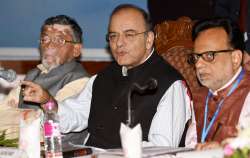Prices of most products may come down as GST Council sets rates for 1,211 items
The Goods and Services Tax (GST) Council meet, headed by Finance Minister Arun Jaitley, on Thursday decided on rates for specific products which may lead to reduction in prices of a majority of products of mass consumption.

The Goods and Services Tax (GST) Council meet, headed by Finance Minister Arun Jaitley, on Thursday decided on rates for specific products which may lead to reduction in prices of a majority of products of mass consumption.
The tax rates for 1,211 items were finalised by the GST Council with 81 per cent facing a levy of up to 18 per cent.
“There is no increase in taxes of the items considered today. In fact, for many of them, taxes have come down,” said Finance Minister Arun Jaitley.
“One criterion in mind is that the overall impact should not be inflationary... We are banking on GST checking evasion and buoyancy in collection,” he added.
The GST council decided to lower tax incidence on items such as sugar, tea, coffee and mithai as well as consumer durables but opted to retain the burden on cars.
Furthermore, a new cess of 3 per cent will now be levied on bikes with engine capacity of over 350cc as they are seen as luxury goods.
Foodgrains have been exempted from GST, which will lower the burden on consumers since they currently face various taxes that add up to around 5 per cent.
Jaitley said that food items, including cereals, will become cheaper as they have been kept under the exempt category to which milk is also proposed to be added.
Taxes on items such as hair oil, soaps and toothpaste has been reduced from around 28 per cent to 18 per cent. In case of coal it has been reduced from 11.69 per cent to 5 per cent, helping lower the cost of power.
Similarly, the burden on those buying refrigerators or washing machines will come down from around 31-32 per cent to 28 per cent.
Jaitley said that while the overall basket of taxes will see a reduction, he hoped for greater tax buoyancy because of greater efficiency and less tax evasion.
"In the overall basket there will be a reduction... but because of greater efficiency and less tax evasion there will be revenue buoyancy and tax collection will go up," he said.
Around 400 items are currently exempt from excise and VAT under the existing indirect tax regime.
With the government announcing that 7 per cent of items will remain under the exempt category, the number of items which enjoy zero per cent tax will come down drastically.